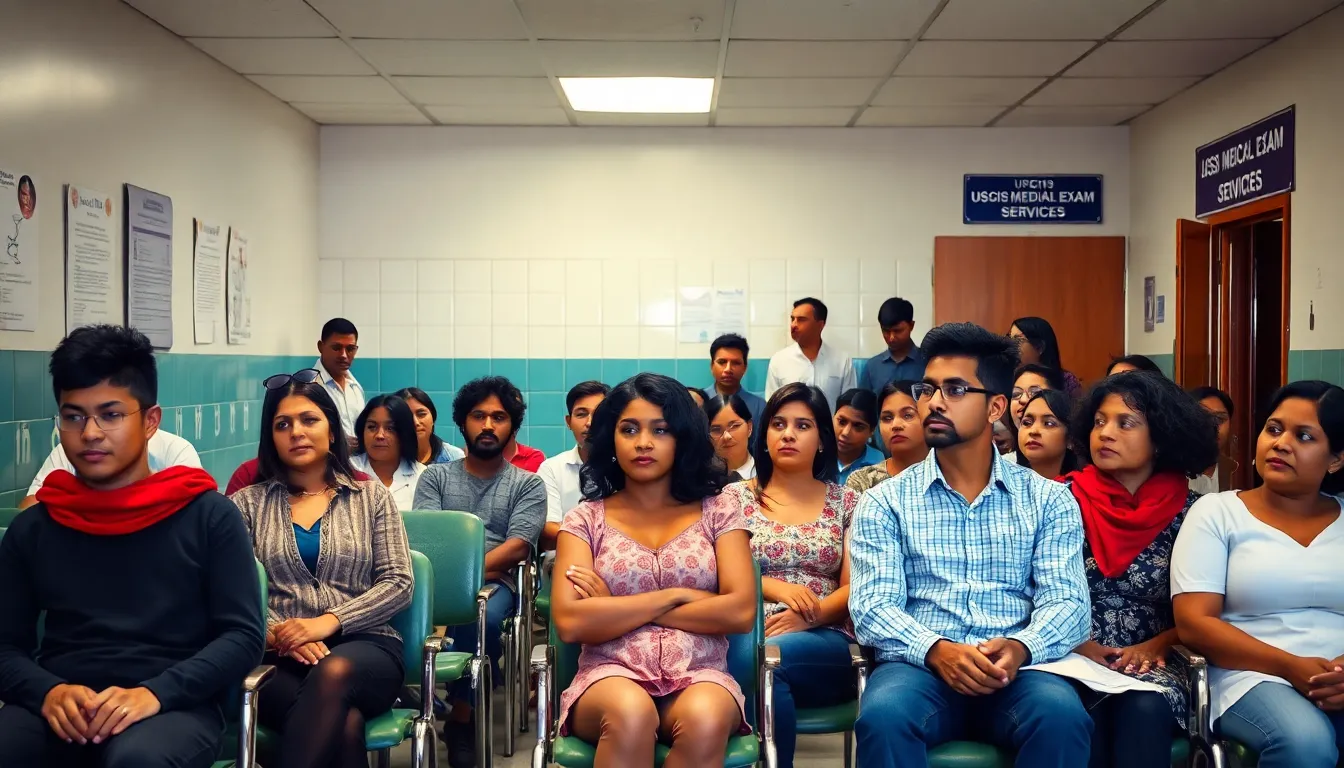Table of Contents
ToggleNavigating the immigration process can feel like a marathon, and just when you think you’ve crossed the finish line, there’s one more hurdle: the USCIS medical exam. Finding a reliable clinic nearby can be as challenging as finding a needle in a haystack. But don’t worry! With a little guidance, you’ll be on your way to that coveted green card without breaking a sweat—or your wallet.
Understanding USCIS Medical Exams
USCIS medical exams play a crucial role in the immigration process. These exams ensure that applicants for green cards meet certain health standards, which is essential for public health and safety.
Importance of the Medical Exam
The medical exam assesses an individual’s health conditions, helping to identify any communicable diseases. Individuals found with certain diseases may face complications in their immigration process. Ensuring vaccinations are up to date also forms part of the exam, as it protects both the applicant and the community. Typically, the exam consists of a physical examination, medical history review, and any required vaccinations. Meeting these health requirements can streamline the path to obtaining a green card.
Who Needs to Take the Medical Exam
Most individuals applying for permanent residency in the U.S. must take the USCIS medical exam. Applicants must complete this exam if they are filing for adjustment of status or submitting Form I-485. Family members and employment-based applicants also need this exam as part of their immigration process. Certain exceptions exist, such as for children under two years old, who may not require the exam in some cases. Understanding who must participate ensures preparedness for this essential step.
Finding USCIS Medical Exam Locations

Finding the right USCIS medical exam location requires some research. Multiple resources exist to help individuals locate reputable clinics.
Online Resources
Various online platforms offer comprehensive listings of authorized physicians for USCIS medical exams. The USCIS website provides a search tool for accredited civil surgeons based on ZIP codes. Additionally, immigration support websites often compile directories, making it easier to compare options. Reviews and ratings on these platforms help gauge the quality of service at local clinics. For personalized assistance, forums and social media groups can offer recommendations from individuals who have recently completed their exams.
Local Clinics and Physicians
Local clinics and physicians play a crucial role in the USCIS medical exam process. Many primary care providers offer this service, particularly those familiar with immigration requirements. It’s essential to confirm that a physician is a designated civil surgeon authorized by USCIS. Scheduling an appointment directly may help ensure availability and shorter wait times. Those considering nearby hospitals should inquire if they provide USCIS medical exam services. Reaching out to multiple facilities allows applicants to compare costs and services effectively.
What to Expect During the Exam
Preparing for the USCIS medical exam involves understanding required documentation and exam components. Familiarity with these aspects can alleviate anxiety and streamline the process.
Required Documentation
Applicants must bring specific documents to the exam. These include a government-issued photo ID, such as a passport or driver’s license. Form I-693, the report of medical examination, is also essential and should be signed by the designated civil surgeon. Vaccination records need to be presented, particularly if vaccines are mandatory for the applicant’s age group. Any medical history documents, particularly relating to past conditions or treatments, should be included as well. Collecting and organizing these items in advance ensures readiness on the exam day.
Exam Components
The medical exam consists of several key components. Medical history assessments help identify any ongoing health issues. A physical examination checks for overall health status, including vital signs and general well-being. Blood tests and urine tests may be performed to screen for diseases. A chest X-ray might be necessary to detect tuberculosis if applicable. The civil surgeon will also review vaccination status and may provide any necessary vaccinations during the visit. Understanding these components prepares applicants for what to expect, leading to a more straightforward experience.
Cost and Insurance Coverage
Understanding the cost and insurance coverage for the USCIS medical exam is essential for applicants. Fees can vary significantly based on location and the specific provider chosen.
Typical Fees for the Exam
Typical exam fees range from $200 to $500. Some clinics may charge additional fees for required vaccinations or tests, increasing overall costs. Applicants should consider contacting multiple providers to gather quotes. Transparency in pricing helps manage budgeting effectively. In some cases, payment plans might be available to alleviate upfront costs.
Insurance and Payment Options
Insurance coverage for the USCIS medical exam may differ based on individual plans. Many insurance providers do not cover this specific exam, as it is a requirement for immigration purposes. Applicants should verify their insurance policy for possible out-of-network benefits. In instances where insurance does not apply, clinics often accept various payment methods. Credit cards, debit cards, and cash payments are commonly accepted. Seeking out clinic-specific financing options can also provide financial flexibility.
Preparing for Your Appointment
Preparing for the USCIS medical exam involves gathering important information and being ready for the exam itself. Following specific steps can help ensure a smooth experience.
Recommended Steps Before the Exam
Confirm the clinic’s hours and location ahead of time. Verify your appointment date and time to avoid any confusion. Bring required documents like a government-issued photo ID, Form I-693, vaccination records, and any pertinent medical history. Review your medical records and be prepared to discuss any past health issues. Consider making a list of current medications or treatments to share with the physician. It’s beneficial to arrange for transportation to the clinic, as some examinations may require additional tests. Preparing in advance can significantly reduce stress on the exam day.
Common Questions to Ask Your Physician
Inquire about the specific tests included in the exam. Asking if any additional vaccinations are necessary is also essential. Clarify how long the exam process typically takes. Confirm if there are any specific preparations needed before tests, such as fasting. Understanding the total cost and what’s included helps in budgeting. Check whether the clinic accepts your insurance or offers payment plans. Discuss the timeline for receiving results and how those results will be submitted to USCIS. Addressing these questions ensures applicants leave the appointment informed and confident.
Navigating the USCIS medical exam is a crucial part of the immigration journey. By understanding the requirements and preparing adequately, applicants can approach this step with confidence. Finding a reputable clinic nearby doesn’t have to be overwhelming. Utilizing online resources and local recommendations can streamline the search process.
Being informed about what to expect during the exam and having all necessary documents ready can alleviate anxiety. With careful planning and research, individuals can ensure a smoother experience and take one step closer to achieving their immigration goals.







